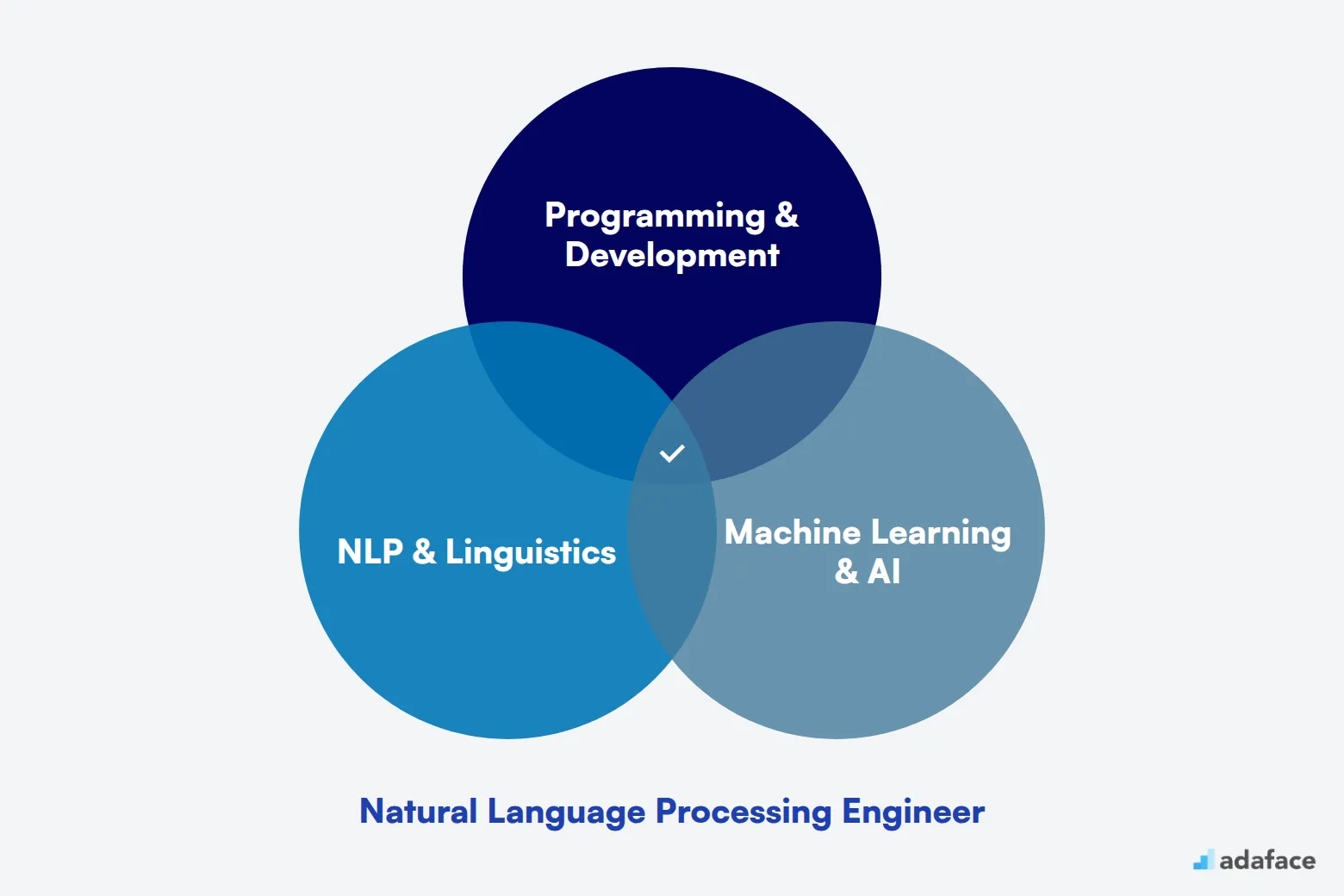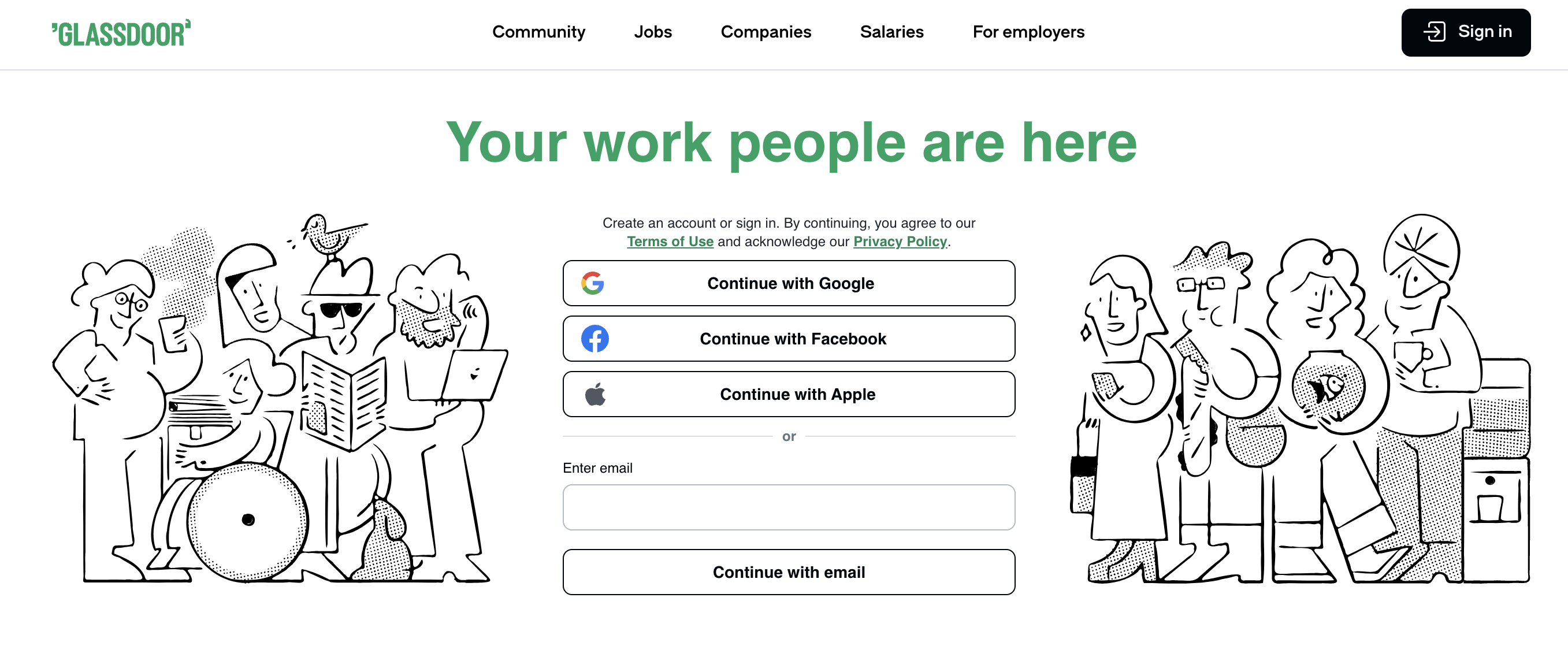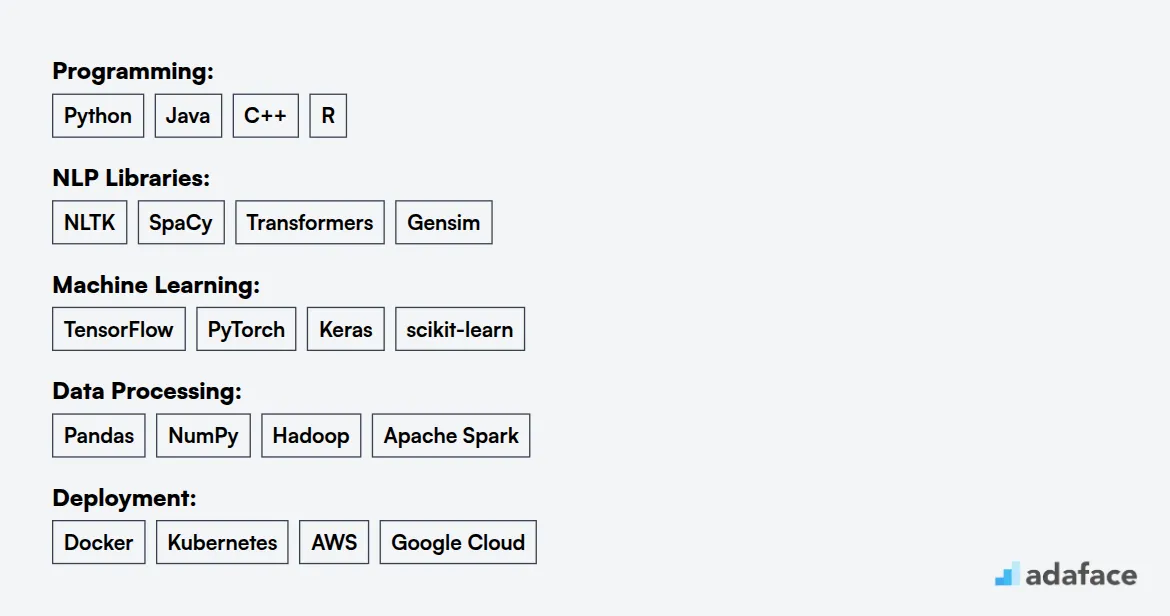As a recruiter, bringing a Natural Language Processing (NLP) Engineer on board is not just about filling a position. It's about strategically enhancing your team with a professional who can harness language technologies to drive business value. Many companies struggle with clearly defining their needs and understanding the specialized skills an NLP Engineer should possess. This role is critical for projects involving language models, machine translation, and speech recognition, yet hiring managers often get distracted by a candidate's general AI knowledge instead of focusing on NLP-specific expertise.
In this article, we guide you through the process of hiring an NLP Engineer by covering everything from crafting a strong job description to evaluating candidates' resumes. For a deeper understanding of job descriptions, take a look at our Natural Language Processing Engineer job description.
Table of contents
Why hire a Natural Language Processing Engineer?
Consider hiring an NLP Engineer when your company faces language-related challenges. For instance, if you need to build a chatbot to improve customer service or develop a sentiment analysis tool for social media monitoring.
NLP Engineers can tackle various tasks such as:
- Text classification and summarization
- Machine translation
- Speech recognition and synthesis
If these projects are central to your business goals, it's time to bring in a full-time NLP specialist. For one-off projects or to test the waters, you might start with a consultant or use pre-built NLP tools before committing to a full-time hire.

What Does a Natural Language Processing Engineer Do?
A Natural Language Processing (NLP) Engineer designs and implements systems that enable computers to understand, interpret, and generate human language. They work on creating algorithms and models that can process and analyze text or speech data, making it possible for machines to interact with humans in a more natural way.
The day-to-day tasks of an NLP Engineer typically include:
- Developing and improving machine learning models for language understanding
- Implementing and optimizing text classification, sentiment analysis, and named entity recognition systems
- Creating chatbots and virtual assistants
- Working with large datasets to train and test NLP models
- Collaborating with data scientists and software engineers to integrate NLP solutions into existing products
- Staying updated with the latest advancements in NLP techniques and technologies
Natural Language Processing Engineer Hiring Process
Hiring a Natural Language Processing (NLP) Engineer involves a well-thought-out process to identify candidates with the right skills and aptitude. Here's a straightforward guide to navigate this process smoothly.
- Craft a compelling job description: Use available resources to define the role and responsibilities clearly. You can refer to NLP Engineer Job Description for guidance.
- Job posting and resume screening: Once the job description is ready, post it on relevant job boards. Anticipate receiving resumes within a week and screen them for key qualifications.
- Initial assessment tests: Conduct skill assessments using role-specific tests to evaluate the technical expertise of candidates. This stage usually spans one to two weeks.
- Interview rounds: Shortlisted candidates should go through multiple interview rounds focusing on technical, problem-solving, and interpersonal skills. This part often takes two to three weeks.
- Final selection and offer: After identifying the best fit, prepare and extend an offer. Aim to complete this within a week.
The entire hiring process typically takes about six to eight weeks. By following these steps, you can systematically identify the right candidate. Stay tuned as we dive deeper into each step with useful checklists and material to aid your hiring journey.
Building the ideal candidate profile for a Natural Language Processing Engineer
Before you begin the hiring process for an NLP Engineer, establishing an ideal candidate profile tailored to your company's unique needs is a key step. The challenge lies in distinguishing between must-have skills and those that are nice to have. For instance, while proficiency in Python and NLP libraries like NLTK is a baseline requirement, experience with cloud platforms such as AWS might be preferred depending on your company’s infrastructure.
To streamline the hiring process, it's important to clearly define what skills are required versus preferred. Required skills may include a solid foundation in computer science and proficiency with NLP tools and machine learning frameworks. On the preferred side, a master's degree in Computational Linguistics or experience deploying NLP models can set candidates apart. Explore more about skills mapping to ensure you're covering all the bases.
| Required skills and qualifications | Preferred skills and qualifications |
|---|---|
| Bachelor's degree in Computer Science, Linguistics, or related field | Master's degree in Computational Linguistics or related field |
| Proficiency in Python and NLP libraries such as NLTK, SpaCy, or Transformers | Experience in deploying NLP models to production |
| Experience with machine learning frameworks like TensorFlow or PyTorch | Strong understanding of cloud platforms such as AWS or Google Cloud |
| Strong understanding of linguistic concepts and language models | Familiarity with RESTful APIs and microservices architecture |
| Experience with data preprocessing and text normalization techniques | Experience with large-scale data processing using Hadoop or Apache Spark |
How to write a Natural Language Processing Engineer job description?
Creating an effective job description for a Natural Language Processing Engineer is key to attracting the right candidates. Once you have a candidate profile ready, the next step is to capture that information in the JD to appeal to suitable talent.
- Highlight key responsibilities and impact: Clearly outline the responsibilities of the NLP engineer, including tasks like developing language models and implementing algorithms. Emphasizing how these contributions will drive innovation in your company can attract motivated professionals seeking impactful work.
- Balance technical requirements with soft skills: Specify the technical skills needed, such as proficiency in Python and experience with NLP libraries like NLTK or SpaCy. However, don't forget to mention the importance of soft skills like critical thinking and effective communication, which are crucial for collaboration in an interdisciplinary team.
- Showcase unique selling points: Describe what sets your company apart, whether it's working on cutting-edge AI projects or having a culture of continuous learning. Highlighting these aspects can help you stand out and attract top talent who want to grow with your organization.
For more detailed insights on crafting your job description, you can refer to the NLP Engineer job description page.
Top Platforms to Source Natural Language Processing Engineers
Now that you have a well-crafted job description, it's time to list your NLP engineer position on job boards to attract qualified candidates. The right platform can significantly impact the quality and quantity of applications you receive. Let's explore some of the best places to post your NLP job listing.
LinkedIn Jobs
Ideal for posting full-time NLP engineer positions. Large professional network allows for targeted job postings and candidate searches.

Indeed
Widely used job board for posting full-time NLP positions. Offers resume search and applicant tracking features.

Glassdoor
Good for posting full-time roles and showcasing company culture. Candidates can view company reviews and salary information.

Other notable platforms include RemoteOK for distributed teams, Stack Overflow Jobs for reaching skilled developers, Kaggle Jobs for data science-focused roles, and AI Job Board for a niche audience of AI professionals. Each platform offers unique benefits, so consider your specific needs when choosing where to post your NLP engineer job.
How to Screen Natural Language Processing Engineer Resumes
Resume screening is a critical first step when hiring a Natural Language Processing (NLP) Engineer due to the high volume of applicants. This process helps filter out candidates who do not meet the basic requirements, allowing you to focus on those who are more likely to be a good fit for your needs.

When manually screening resumes, look for specific keywords that align with the role's requirements. Keywords such as Python, NLTK, TensorFlow, and text normalization are important. Scanning resumes for these terms can help you quickly identify candidates with necessary skills and experience. For further insights into the skills required for a Natural Language Processing Engineer, visit this blog.
Utilizing AI language models can streamline the resume screening process. Tools like ChatGPT allow you to input a set of desired keywords and automatically evaluate resumes for matches. This approach can save time and help ensure consistent evaluation of candidate qualifications.
Here's a sample prompt you can use with AI tools to facilitate resume screening:
TASK: Screen resumes to match job description for NLP Engineer role
INPUT: Resumes
OUTPUT: For each resume, provide the following information:
- Email id
- Name
- Matching keywords
- Score (out of 10 based on keywords matched)
- Recommendation (detailed recommendation of whether to shortlist this candidate or not)
- Shortlist (Yes, No or Maybe)
RULES:
- If you are unsure about a candidate's fit, put the candidate as Maybe instead of No
- Keep recommendation crisp and to the point.
KEYWORDS DATA:
- Programming (Python, Java, C++)
- NLP Libraries (NLTK, SpaCy, Transformers)
- Machine Learning Frameworks (TensorFlow, PyTorch)
- Data Processing (Hadoop, Apache Spark)
You can further explore AI resume screening solutions to enhance your recruitment strategies.
Recommended Skills Tests to Screen Natural Language Processing Engineers
Hiring the right Natural Language Processing (NLP) Engineer can be a game-changer for your organization. Since NLP involves a blend of linguistics and machine learning, skills tests are recommended to accurately assess a candidate's qualifications beyond their resume. Here are our top picks for skills tests to evaluate prospective NLP Engineers.
The NLP Online Test is tailored to evaluate a candidate's expertise in natural language processing concepts and applications. It's perfect for gauging their understanding of text processing, language models, and semantic analysis.
A Python Online Test helps measure a candidate's proficiency in Python, a language frequently used in NLP projects. Python's libraries such as nltk, spaCy, and TensorFlow are crucial for developing and testing NLP models.
The Machine Learning Online Test is essential for assessing a candidate's machine learning knowledge. This includes their ability to implement algorithms that are often used in NLP tasks such as classification and clustering.
To evaluate proficiency in deep learning, particularly with frameworks utilized in NLP, the TensorFlow Test is recommended. It assesses a candidate's ability to create and train models using TensorFlow, a common tool in deep learning applications.
Lastly, consider the Prompt Engineering Test for roles focusing on generative AI. It assesses a candidate's skill in designing prompts for AI models, which is increasingly important in NLP for tasks like text generation and dialogue systems.
How to Structure Interviews for Hiring Natural Language Processing Engineers
Once candidates pass the initial skills tests, the next step is to bring them in for technical interviews to further assess their hard skills. While skills tests are excellent for filtering out unqualified candidates, interviews are where you identify those who are truly suited for the role. This stage allows you to dive deeper into their expertise and problem-solving abilities, which are crucial in the domain of Natural Language Processing.
Here are some sample interview questions to consider:
- How would you approach a sentiment analysis task using NLP techniques?
- Can you explain the difference between named entity recognition and part-of-speech tagging?
- Describe how you would handle unstructured text data.
- What are some common challenges you face when working with language models?
- How do you ensure that your NLP models are fair and unbiased?
These questions help assess the candidate’s practical understanding and adaptability to real-world NLP problems. They also gauge their experience with NLP tools and methodologies, ensuring they align with the role's requirements.
What's the difference between an NLP Research Scientist and an NLP Engineer?
Although NLP Research Scientists and NLP Engineers both work in the field of Natural Language Processing, their roles and focus areas differ significantly. People often mix them up because both involve working with languages and algorithms, but the nature of their work is quite distinct.
NLP Research Scientists usually hold advanced degrees like a PhD or Masters in fields such as Linguistics or Computer Science. They focus on theoretical and academic research, developing new NLP algorithms and diving deep into deep learning and statistical modeling. They typically work with tools like TensorFlow and PyTorch, and programming languages such as Python and R.
On the other hand, NLP Engineers are often seen with a Bachelor's or Master's in fields like Computer Science or Software Engineering. Their work is more about implementing NLP solutions and improving existing systems for practical applications. They focus on software development and system design, often using programming languages such as Python, Java, and C++. The tools they work with include SpaCy, NLTK, and cloud platforms like AWS.
To attract the best technical talent for these roles, understanding the skills required is important. This knowledge helps in tailoring the recruitment process to find the right candidate for each specific role.
| NLP Research Scientist | NLP Engineer | |
|---|---|---|
| College Degree | Linguistics, Computer Science, Math | Computer Science, Software Engineering |
| Level of Education | PhD or Masters | Bachelors or Masters |
| Work Responsibilities | Develop new NLP algorithms, Conduct research | Implement NLP solutions, Improve existing systems |
| Focus | Theoretical and academic research | Practical application and system integration |
| Skill Set | Deep learning, Statistical modeling | Software development, System design |
| Programming Languages | Python, R | Python, Java, C++ |
| Tools | TensorFlow, PyTorch | SpaCy, NLTK, AWS |
| Keywords | Research, Innovation, Algorithms | Implementation, Optimization, Deployment |
What are the ranks of Natural Language Processing Engineers?
Many people often confuse the different ranks within the Natural Language Processing (NLP) engineering field. The hierarchy can vary depending on the organization, but generally, there are several distinct levels of NLP engineers.
- Junior NLP Engineer: This is an entry-level position for those with a strong foundation in NLP concepts and programming skills. They typically work on smaller projects or components of larger systems under supervision.
- NLP Engineer: At this level, engineers have a few years of experience and can work independently on more complex NLP tasks. They're often responsible for developing and implementing NLP models and algorithms.
- Senior NLP Engineer: These professionals have extensive experience and deep expertise in NLP. They lead projects, mentor junior team members, and make significant architectural decisions for NLP systems.
- Principal NLP Engineer: This is a leadership role that involves setting the technical direction for NLP initiatives within an organization. They often collaborate with other departments and contribute to the company's overall AI strategy.
- NLP Architect: At the highest level, NLP architects design large-scale NLP systems and oversee their implementation across multiple teams or products. They're also involved in research and innovation within the field.
When hiring for these positions, it's crucial to assess candidates' technical skills and experience level. Using NLP-specific coding tests can help evaluate their practical abilities and ensure you're bringing the right talent on board for each rank.
Hire the Best Natural Language Processing Engineers
Throughout this guide, we've navigated the intricacies of hiring a Natural Language Processing Engineer, covering their roles, the hiring process, and how to craft the ideal job description. We've also explored where to find top talent, how to screen resumes, and the skills essential for the role.
The key takeaway? Crafting precise job descriptions and leveraging skills tests can significantly enhance your hiring accuracy. To screen potential candidates effectively, consider using specialized assessments like the NLP online test to ensure you find the right match for your organization.
Natural Language Processing (NLP) Test
FAQs
A Natural Language Processing Engineer typically focuses on designing and implementing algorithms for processing and interpreting human language, building language models, and collaborating on AI-powered applications like chatbots and voice assistants.
Key skills include proficiency in programming languages such as Python, experience with NLP libraries like NLTK or spaCy, and a strong understanding of machine learning and data preprocessing techniques.
Consider using skills assessment tools such as coding tests or practical NLP challenges to evaluate their technical proficiency. Visit our coding tests page for more information.
An NLP Engineer focuses on applying techniques to create functional applications, while an NLP Research Scientist is involved in advancing the field through research and developing new methodologies.
You can find candidates on platforms such as LinkedIn, GitHub, or through specialized job boards that focus on AI and machine learning roles.
Include a mix of behavioral, technical, and problem-solving questions, and consider practical tests to fully understand their approach and capabilities.
Ranks can range from entry-level to senior roles, and vary based on experience, expertise, and the complexity of projects they've handled in the past.

40 min skill tests.
No trick questions.
Accurate shortlisting.
We make it easy for you to find the best candidates in your pipeline with a 40 min skills test.
Try for freeRelated posts
Free resources



